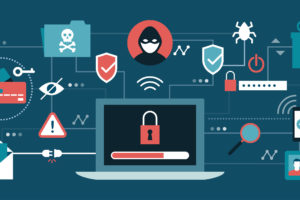As the internet brings more people and businesses together, there are hackers waiting to take advantage of digital weaknesses. According to Alert Logic, 58% of all malware attacks were aimed at small businesses. And the terror doesn’t stop there —Hiscox states that the average cost of a cyberattack for small businesses was $34,604.
In order to avoid paying hefty ransoms and leaking important information you should be aware of the following kinds of cyberattacks directed towards small businesses — and how to combat them with cybersecurity strategy.
Phishing and Spear Phishing
Phishing is the practice of sending emails that look like they’re from reputable companies but aren’t. Typically, phishing emails seem legitimate, but actually lead to the target revealing sensitive information, like credit card numbers and passwords. Once the phisher has the important information in their possession, they use it to steal identities or money. Phishing emails are typically not personalized.
Spear phishing is a type of phishing that involves sending an email from a known, trusted, or reputable sender. These emails are highly targeted, and may masquerade as routine communications from vendors or business partners. As with phishing, spear phishing’s goal is largely the same — to extract valuable information and money.
How to Avoid: Don’t fall prey to phishing scams. Always check the URL of the site you’re on before providing important information. If you can avoid it, don’t submit financial information over the internet — give it over the phone instead. Avoid clicking on pop-ups or install a pop-up blocker and keep your antivirus up to date.
Malware
Malware is an abbreviation of the words “malicious software.” Malware often installs itself onto your device. Then, it can skim your computer for information, install programs that secretly track your device activity, delete important files, and make your browser visit different websites than you intended. While malware can’t damage the physical components of your computer, it can negatively impact your network and slow your computer down.
How to Avoid: Only visit websites you trust. Don’t click on pop-up windows. Install a good antivirus and keep it up to date. Use a firewall and a pop-up blocker. Stay alert for the signs of malware, too: slow computers, web browsers acting strangely, and pop up ads.
Internal Attacks
One of the other most common cyberattacks comes from a place most business owners never expect: within their organization. In fact, a study by IBM concluded that 60% of all cyberattacks came from inside of the organization. For this attack, an employee or contractor uses your network to scrape important information. This information can be confidential human resources files, banking information, a vendor list, or more.
Because your organization’s information is being accessed from inside by trusted people and systems, internal cyberattacks often fly under the radar. They are hard to detect and difficult to pinpoint.
How to Avoid: Limit information access to key parties. Make sure that your most important data is the most protected. Enforce good “digital hygiene” by making people change their passwords regularly. And, if you’re really worried about internal attacks, invest in a trusted outside IT authority who will monitor employees’ daily information and network usage.
Vodigy Software is a trusted custom software provider to the St. Paul and Minneapolis area. We specialize in providing expert guidance and assistance to businesses. If you would like to make your business run more safely, contact us today!




